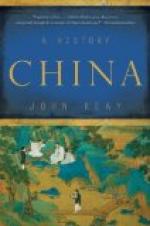One other industry should also be mentioned. With the development of printing, which will be discussed below, the paper industry was greatly stimulated. The state also needed special types of paper for the paper currency. Printing and book selling became a profitable business, and with the application of block print to textiles (probably first used in Sung time) another new field of commercial activity was opened.
As already mentioned, silver in form of bars had been increasingly used as currency in Sung time. The yearly government production of silver was c. 10,000 kg. Mongol currency was actually based upon silver. The Ming, however, reverted to copper as basic unit, in addition to the use of paper money. This encouraged the use of silver for speculative purposes.
The development of business changed the face of cities. From Sung time on, the division of cities into wards with gates which were closed during the night, began to break down. Ming cities had no more wards. Business was no more restricted to official markets but grew up in all parts of the cities. The individual trades were no more necessarily all in one street. Shops did not have to close at sunset. The guilds developed and in some cases were able to exercise locally some influence upon the officials.
6 Growth of the small gentry
With the spread of book printing, all kinds of books became easily accessible, including reprints of examination papers. Even businessmen and farmers increasingly learned to read and to write, and many people now could prepare themselves for the examinations. Attendance, however, at the examinations cost a good deal. The candidate had to travel to the local or provincial capital, and for the higher examinations to the capital of the country; he had to live there for several months and, as a rule, had to bribe the examiners or at least to gain the favour of influential people. There were many cases of candidates becoming destitute. Most of them were heavily in debt when at last they gained a position. They naturally set to work at once to pay their debts out of their salary, and to accumulate fresh capital to meet future emergencies. The salaries of officials were, however, so small that it was impossible to make ends meet; and at the same time every official was liable with his own capital for the receipt in full of the taxes for the collection of which he was responsible. Consequently every official began at once to collect more taxes than were really due, so as to be able to cover any deficits, and also to cover his own cost of living—including not only the repayment of his debts but the acquisition of capital or land so as to rise in the social scale. The old gentry had been rich landowners, and had no need to exploit the peasants on such a scale.
The Chinese empire was greater than it had been before the Mongol epoch, and the population was also greater, so that more officials were needed. Thus in the Ming epoch there began a certain democratization, larger sections of the population having the opportunity of gaining government positions; but this democratization brought no benefit to the general population but resulted in further exploitation of the peasants.




